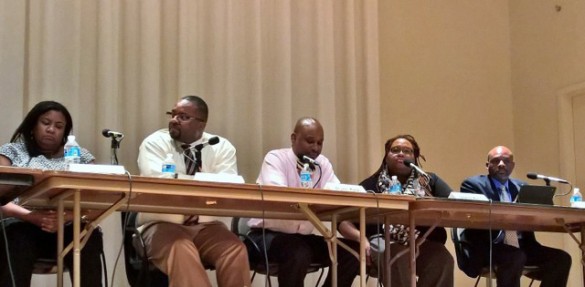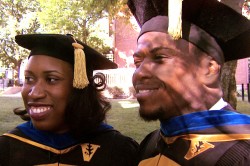
Panelists discuss cultural and structural barriers to the advancement of people of color in the STEM fields. (Image provided)
African Americans are one of the most underrepresented racial groups in engineering faculty positions, and mentorship programs have done little to remedy that dire statistic.
This was just one topic of discussion for top national scholars, who assembled at Vanderbilt University for a frank conversation about the lack of diversity in the science, technology, engineering and mathematics (STEM) fields, and the cultural and structural barriers for students of color.
Scholars from across the country were invited to present their research insights on issues spanning the educational pipeline, from pre-K to Ph.D.
The June 2 event was hosted by Ebony O. McGee, assistant professor of diversity and urban schooling in the Department of Teaching and Learning at Vanderbilt’s Peabody College of education and human development; and William H. Robinson, associate chair of electrical and computer engineering and associate professor of electrical engineering at Vanderbilt.
McGee and Robinson head up National Science Foundation research studies which focus on diversity in the STEM fields. They examine the critical factors that result in African Americans being one of the most underrepresented racial groups in engineering faculty positions, and why intervention programs that aim to broaden the participation of minorities in engineering have not been effective.
“Statistics and studies that frame the lives and educational experiences of children of color in deficit-oriented ways, such as a culture of poverty and negative stereotypes, are ubiquitous in STEM education,” McGee said. “However, missing from this perception and what the mentor scholars boldly brought to the forefront is a proper recognition of the structural barriers—the racial practices, policies and ideologies—formed at the critical intersections of race, gender and ability in STEM.”
The multidisciplinary discussion also allowed the scholars to reimagine STEM across a variety of educational paradigms, perspectives and disciplines, which is critical to finding solutions for the challenges at hand, she said.

Scholars from across the country gathered for the diversity in STEM summit at Vanderbilt June 2. (image provided)
The panel addressed key questions, including, How does structural racism manifest in the everyday experiences of students and teachers of color in K-12 schools and higher education? Do these experiences manifest differently in STEM contexts? What is the role of mentorship in fostering a healthy and culturally affirming STEM identity in students and professionals of color? What can institutions do to create or improve their climate so that it enhances the opportunities of their students of color in STEM and recognizes and fosters the brilliance of these students?
Summit participants included (in alphabetical order):
- Tony N. Brown, associate professor and associate chair of sociology, Vanderbilt
- Dorinda J. Carter Andrews, associate professor, Department of Teacher Education, Michigan State University
- Robbin Chapman, associate provost and academic director of diversity and inclusion; and lecturer, Department of Education, Wellesley College
- Monica Cox, associate professor, School of Engineering Education, Purdue University
- Derek Griffith, associate professor, Center for Medicine, Health and Society, Vanderbilt
- Bryant Marks, associate professor of psychology, Morehouse College
- Danny Martin, professor and department chair of curriculum and instruction, University of Illinois at Chicago
- Susana Morris, associate professor, Department of English, Auburn University
- Jomo Mutegi, associate professor of science education, School of Education, Indiana University-Purdue University Indianapolis
- David Stovall, associate professor of African American studies and educational policy studies, University of Illinois at Chicago
Learn more about McGee and Robinson’s research or watch a video of the event.
Other ‘diversity in STEM’ efforts at Vanderbilt
Last month a new “bridge to doctorate” program was launched by a coalition of Tennessee universities, led by Tennessee State University and Vanderbilt. The program will work to increase the number of minority students who earn a Ph.D. in science, technology, engineering and math. It is funded by a National Science Foundation $987,000 grant to TSU as an expansion of the Tennessee Louis Stokes Alliance for Minority Participation, or TLSAMP.
TLSAMP BD @ VU will fund 12 students and will recruit students both nationally and within TLSAMP institutions, building on the successful Fisk-Vanderbilt Masters-to-Ph.D. Program, which launched in 2004.


